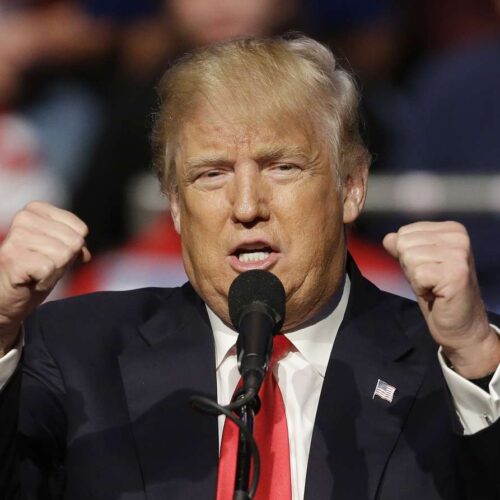Introduction
Update, 8:44 p.m., May 3, 2016: Sen. Ted Cruz suspended his presidential campaign after losing to Donald Trump in the Indiana primary.
How much are some Republicans still willing to spend to stop Donald Trump from becoming president?
In Indiana, which conducts its primary today, they’ve poured more than $5.5 million into television and radio ads attacking Trump or touting his chief rival, Ted Cruz, according to a Center for Public Integrity analysis of data provided by The Tracking Firm, a nonpartisan media tracking company headquartered in Washington, D.C.
Many of these ads prominently featured former presidential candidate and Hewlett-Packard CEO Carly Fiorina, who Cruz has selected to be his running mate should he win the Republican presidential nomination.
Trump’s own campaign, meanwhile, has spent about $870,000 on ads in the Hoosier State.
Indiana’s 57 available delegates are crucial: Cruz’s chances of winning enough delegates to keep Trump from clinching the GOP presidential nomination fall dramatically if the senator from Texas fails to beat the billionaire real estate tycoon Tuesday.
Heading into Indiana’s contest, Trump needed about 240 more delegates — or roughly half of those remaining — to win the nomination outright, according to the Associated Press. Nine more states are slated to conduct their nominating contests after Tuesday, including delegate-rich California and New Jersey.
Given this, Indiana’s primary represents “a desperate last stand for Ted Cruz and the #NeverTrump movement,” political analyst David Wasserman of the Cook Political Report wrote on FiveThirtyEight.com on Monday.
To be sure, paid advertising is not the only way for candidates to reach voters. Both Trump and Cruz have been campaigning hard in Indiana, as well.
Fellow Republican presidential candidate John Kasich, governor of neighboring Ohio, has not campaigned actively in Indiana. The Kasich and Cruz campaigns last month struck a tenuous agreement in which Kasich would give Cruz “a clear path” to take on Trump in Indiana, while Cruz would defer to Kasich in Oregon and New Mexico.
In Indiana, Cruz’s own campaign has spent about $1.2 million on TV, cable and radio ads, according to The Tracking Firm.
But a handful of other conservative groups have spent millions more, including $1.6 million from a pro-Cruz super PAC called Trusted Leadership PAC, $1.3 million from the super PAC of the anti-tax Club for Growth and $1.2 million from an anti-Trump super PAC called Our Principles PAC.
Source: Center for Public Integrity analysis of data from The Tracking Firm covering television, cable and radio ads targeting Indiana voters broadcast between April 17, 2016, and May 3, 2016.
An Iowa-based nonprofit called the American Future Fund has also about $200,000 on anti-Trump TV ads, while National Right to Life, an anti-abortion group that has endorsed Cruz, has spent about $40,000 on radio ads.
Combined, Cruz, his allies and other anti-Trump forces aired about 8,600 ads in Indiana since April 21, according to a Center for Public Integrity analysis data from Kantar Media/CMAG, a firm that monitors advertising on broadcast television and national — but not local — cable.
That represented about three-fourths of all TV ads in Indiana’s GOP presidential primary.
One ad from the Trusted Leadership PAC showcased Indiana Gov. Mike Pence’s endorsement of Cruz, while noting that Trump was “one of the leaders” of the effort to keep boxer Mike Tyson out of prison after Tyson was convicted of rape in 1992.
Others ads, sponsored by Our Principles PAC, criticized Trump’s online education company as a “scam” and argued that Trump “isn’t fit for the most important job in the word.”
The top donors to Our Principles PAC are Marlene and Joe Ricketts, co-owners of the Chicago Cubs baseball team, who have combined to give $5.5 million.
Trusted Leadership PAC’s two largest donors have each given the group $1 million. They are Illinois businessman Richard Uihlein and the Herzog Contracting Corp., a Missouri-based construction company founded by Stan Herzog.
Source: Center for Public Integrity analysis of data from Kantar Media/CMAG covering ads in the GOP presidential primary broadcast between April 1, 2015, and May 2, 2016.
Note: Kantar Media/CMAG tracks ads on broadcast television and national — but not local — cable. Some ads critical of Donald Trump were also critical of other candidates.
More than 64,000 ads have now attacked Trump since the 2016 presidential election began, according to a Center for Public Integrity review of Kantar Media/CMAG data.
Already, some political groups have begun attacking Trump on the TV airwaves in Oregon, which holds its primary later this month, and California, where voters will head to the polls on June 7.
Meanwhile, Indiana’s Democratic primary is also a critical contest for underdog Bernie Sanders. The senator from Vermont badly trails front-runner Hillary Clinton in the delegate race — even as he has essentially matched her in campaign fundraising.
Clinton has not spent a dime on paid television or radio advertising in Indiana, according to The Tracking Firm, while Sanders has spent more than $1.7 million. Both candidates also have field operations in the state and have rallied supporters there in recent days.
According to Kantar Media/CMAG, Sanders’ spending spree translated into about 4,200 TV ads targeting Indiana voters — about one ad every 5 minutes, on average, since April 18.
Meanwhile, Clinton’s supportive super PACs have also mostly stayed idle. The largest pro-Clinton super PAC, Priorities USA Action, told the Federal Election Commission it planned to spend a mere $2,500 on anti-Trump digital ads in Indiana.
Sanders campaign spokesman Michael Briggs told the Center for Public Integrity that spending “considerable amounts on television advertising” has allowed Sanders to “overcome the built-in political advantages [Clinton] has from being the establishment candidate.”
In Indiana, where most polls show Clinton leading, Briggs nevertheless argued that “things are looking pretty good,” adding, “this could be the beginning of another good streak for our campaign.”
Clinton campaign spokesman Jesse Ferguson declined to comment.
“We don’t comment on our ad strategy,” Ferguson said.
Read more in Money and Democracy
Money and Democracy
Death threats directed at elections regulator
FEC Commissioner Ann Ravel targeted for views on Internet regulation
Money and Democracy
‘John Doe’ explains Panama Papers and why the ICIJ
Note from the Center


Join the conversation
Show Comments